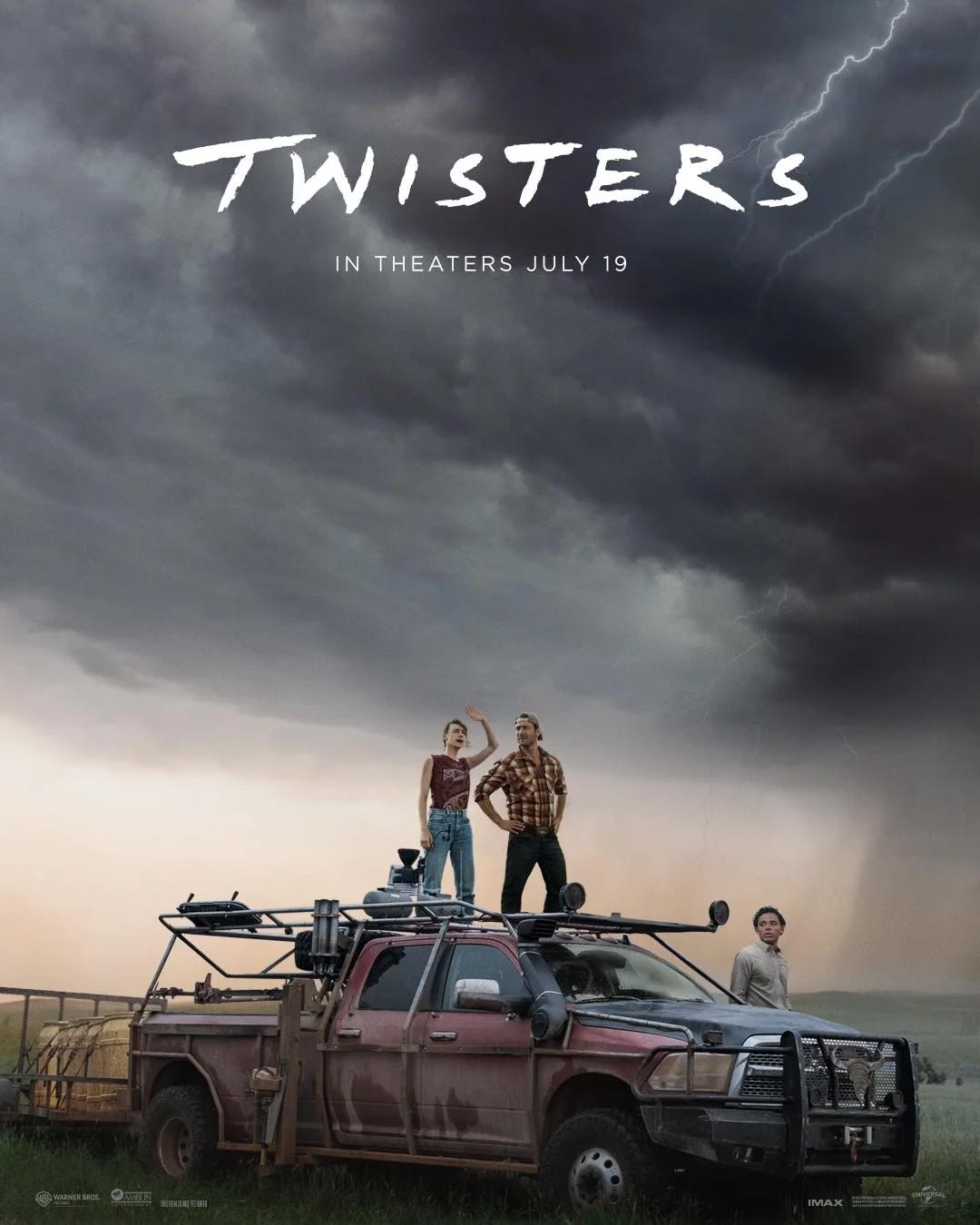The Only Thing More Terrifying Than Monster Tornadoes is Geoengineering
Spoiler alert for those who haven't seen the summer blockbuster yet.
Cast your thoughts back to August 2019.
It was a time before COVID-19. A time before the Inflation Reduction Act. A time before ChatGPT.
On August 25, 2019, Axios reported that during a briefing at the White House, President Trump suggested ‘nuking’ hurricanes. The President apparently suggested dropping a bomb in the eye of the hurricane while it was in the Atlantic Ocean before it reached the shores of the United States.
At the time, the idea seemed ridiculous. And President Trump was mocked by famous television scientist Bill Nye for reportedly suggesting it.
I am typing this on Sunday afternoon pacific time having just seen the latest Hollywood blockbuster - Twisters.
To get the easy part out of the way, the director of Twisters has already addressed why the film doesn’t mention climate change.
I just wanted to make sure that with the movie, we don’t ever feel like (it) is putting forward any message. I just don’t feel like films are meant to be message-oriented. - Lee Isaac Chung
And to be fair, the connection between tornadoes and climate change isn’t clear yet.
According to NOAA, “the influence of climate change on tornadoes is far more difficult to discern. Numerous complex atmospheric conditions combine to generate a tornado, and researchers are still developing tools to help discern potential human influence from natural variability.”
Putting that to the side - my challenge with the film is its apparent endorsement of geoengineering. And more importantly the idea that we can and should control other parts of the natural world.
Kate Carter - the female lead - is a science wiz who possesses a sixth sense around detecting tornadoes. While researching for her PhD, she loses several friends chasing a tornado in an attempt to release a material into the tornado to encourage it to dissipate.
After moving to New York to pursue a career with NOAA, she is dragged back into tornado chasing under the guise of gathering data to prevent the storms from destroying small towns like the one she is from. (We later find out the startup that drags her back in is funded by a real estate vulture using the data to buy up properties below market value that have been destroyed by storms.)
Skipping ahead, she and Tyler Owens - a YouTube-famous meteorologist known as a tornado wrangler - rediscover her research. They use data from the aforementioned start-up to tweak her model, eventually ‘killing’ a tornado before it completely rips apart a small town in Oklahoma.
While the film is very fictional, geoengineering is unfortunately all too real.
If you aren’t familiar with geoengineering or ‘climate engineering’ as it is sometimes called, it is the umbrella idea that we - humans - can essentially control the climate. (And in the process reverse the damage our behavior has spurred without having to change much.) The main example so far has been a startup called ‘Make Sunsets’ that has reportedly released sulfur particles into the atmosphere to reflect the sun’s rays. The hope is that it could cool a planet warming at the hands of human activity by reflecting the rays before they reach the surface of Earth.
The approach is highly controversial.
Little is known about the real-world effect of such deliberate interventions at large scales, but they could have dangerous side effects. The impacts could also be worse in some regions than others, which could provoke geopolitical conflicts.
And the startup unilaterally deployed the technology with little-to-no review or counsel.
Make Sunsets, appears to have moved forward with launches from a site in Mexico without any public engagement or scientific scrutiny.
A report from NPR in April of this year revealed more details about the company.
The founder got the idea from a fictional novel by Neal Stephenson, called ‘Termination Shock'. The solar geoengineering in the novel is led by a Texas oil-industry billionaire.
The startup is testing its project in Silicon Valley, releasing balloons filled with helium and sulfur dioxide gas. The founder warns the NPR reporter against taking a breath when the sulfur dioxide starts to leak.
The startup has raised $1.2M dollars from venture capital heavyweights like Draper Associates. And it isn’t the only startup in the space raising millions.
Sitting in the theater just one row behind a man in a ‘Trump 2024’ hat, I couldn’t help but cringe at the premise of the film. What once would have been a ridiculous romp with a clearly fictional premise (I am looking at you Armageddon), the idea that we can control the climate and the weather has become all too real.
In an age when the public’s view of science is in decline, it leaves space for barely vetted ideas like geoengineering to gain strength. Instead of engendering a healthy respect for the power of natural weather events, Twisters propagates a belief of hubristic control that has already gained a dangerous foothold in reality.
Geoengineering tactics may turn out to beneficial to all living-kind. Or they may have severe unintended consequences, the least of which would be enabling us to eek out a few more decades of a very imbalanced relationship with the more-than-human world. We shouldn’t allow it to be continue without regulation and oversight.
Three Things
Trillion-dollar Companies Urge Action on Biodiversity Loss (Read on Reuters) - Companies are starting to realize that biodiversity loss at human hands could hit their bottom line.
Omnivore (Watch on Apple TV+) - A new documentary series from Chef Rene Redzepi of restaurant noma investigating the ingredients that have shaped humanity.
My interview with Jorge Gaviria of Masienda (Listen on Apple Podcasts) - Episode 8 of Omnivore focuses on corn. If you want to go deeper on our unique human relationship with corn, check out the interview from my old podcast You Can’t Eat Money with Masienda founder Jorge Gaviria.





